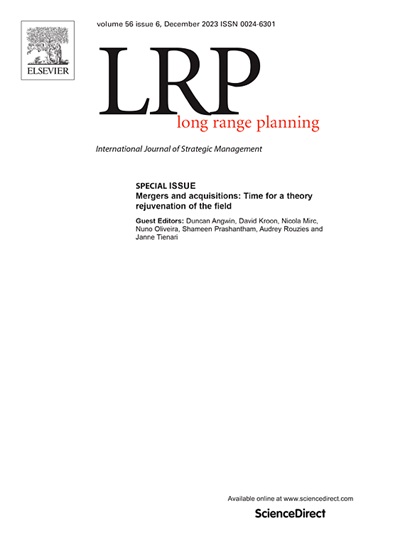人工智能在自适应策略创造和实施中的应用:增强策略过程中的注意控制
IF 6.3
2区 管理学
Q1 BUSINESS
引用次数: 0
摘要
本文主要关注在战略创建和实施过程中部署专有的人工智能(AI)系统,并特别关注它们在增强组织注意力控制方面的作用。通过采用基于注意力的观点(ABV)作为总体理论框架,我们研究了在专有数据上训练的公司特定人工智能系统如何支持战略流程。我们确定了人工智能在战略制定和实施过程中的三个关键贡献:(1)扩大组织对外部和内部发展的关注,(2)通过提高透明度和包容性使战略过程民主化,以及(3)通过实时监测战略实施进展加速反馈循环。还讨论了与部署人工智能系统进行注意力控制相关的潜在挑战。最后,提出了今后的研究方向。本文章由计算机程序翻译,如有差异,请以英文原文为准。
Artificial intelligence in adaptive strategy creation and implementation: Toward enhanced attentional control in strategy processes
This article focuses on the deployment of proprietary artificial intelligence (AI) systems in strategy creation and implementation processes, with a specific focus on their role in enhancing organizational attentional control. By employing the attention-based view (ABV) as an overarching theoretical framework, we examine how company-specific AI systems trained on proprietary data can support strategy processes. We identify three key contributions of AI in strategy creation and implementation processes: (1) broadening organizational attention to external and internal developments, (2) democratizing strategic processes through improved transparency and inclusivity, and (3) accelerating feedback loops with real-time monitoring of strategy implementation progress. Potential challenges associated with the deployment of AI systems for attentional control are also addressed. The paper concludes by putting forward potential directions for future research.
求助全文
通过发布文献求助,成功后即可免费获取论文全文。
去求助
来源期刊

Long Range Planning
Multiple-
CiteScore
13.00
自引率
7.10%
发文量
75
期刊介绍:
Long Range Planning (LRP) is an internationally renowned journal specializing in the field of strategic management. Since its establishment in 1968, the journal has consistently published original research, garnering a strong reputation among academics. LRP actively encourages the submission of articles that involve empirical research and theoretical perspectives, including studies that provide critical assessments and analysis of the current state of knowledge in crucial strategic areas. The primary user base of LRP primarily comprises individuals from academic backgrounds, with the journal playing a dual role within this community. Firstly, it serves as a platform for the dissemination of research findings among academic researchers. Secondly, it serves as a channel for the transmission of ideas that can be effectively utilized in educational settings. The articles published in LRP cater to a diverse audience, including practicing managers and students in professional programs. While some articles may focus on practical applications, others may primarily target academic researchers. LRP adopts an inclusive approach to empirical research, accepting studies that draw on various methodologies such as primary survey data, archival data, case studies, and recognized approaches to data collection.
 求助内容:
求助内容: 应助结果提醒方式:
应助结果提醒方式:


